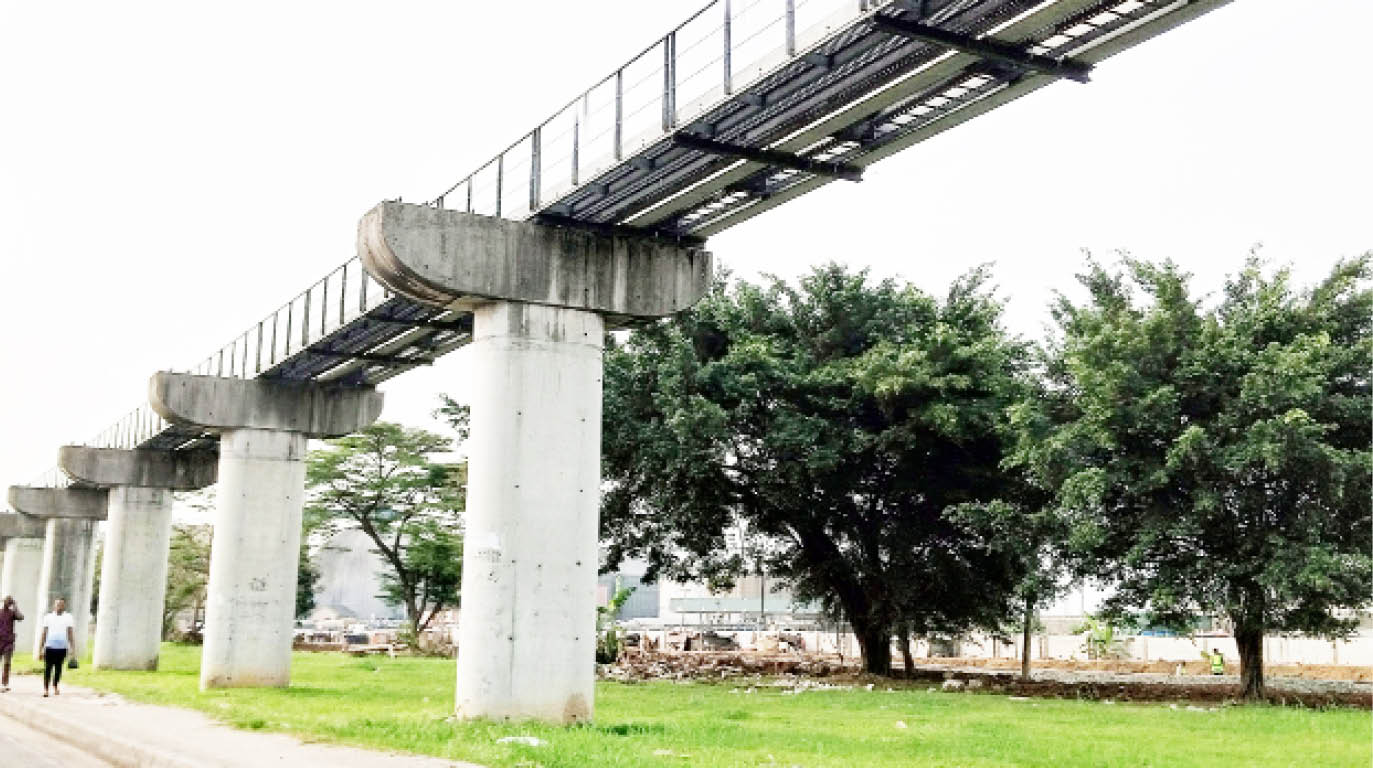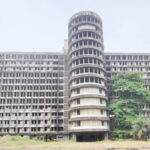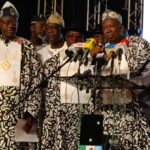Twelve years after the idea was conceived and contract awarded, the monorail has become one of the abandoned projects in Rivers State.
The $400 million project was awarded by the Chibuike Rotimi Amaechi-led administration in 2012 to improve transportation and decongest traffic in the popular Port Harcourt-Aba road and bring succour to numerous residents of the state who could not afford the increasing cost of commercial road transportation.
The project started in full swing in 2013 with installation of pillars along the stretch of Port Harcourt. But 12 years down the line, the gigantic monorail pillars erected from the popular UTC junction to the Station road in Port Harcourt has become a monument of shame and abandonment.
The abandoned project had many features and was supposed to be in many compartments.
- FMBN to revive 46 abandoned housing projects
- Why reconciling El-Rufai, Gov Sani may be waste of time – Shehu Sani
According to the project sketch obtained by our correspondent, the planned construction of the monorail is to be in two phases. Phase 1A started from Sharks Port station to UTC station with an intermediate stop at Azikiwe station. Phase 1B extends the route to the North with three steps at Isaac Boro station, Garrison station and Waterlines. The overall distance from Sharks park to Waterlines was to be 5.4 kilometers.
The system was to use Intamin People Mover P30 monorail trains and one vehicle was delivered. One train was to be in operation in Phase 1A and six in Phase 1B.
After guzzling a whooping sum of money, the project has become a relic of waste to the government of Rivers State.
Out of phases 1A and 1B, expected to stretch up to the popular Garrison to Waterlines in Port Harcourt, only few pillars were erected from the UTC to Station bus stop.
The decision to build the monorail, our correspondent learnt, was taken in 2009 by the Amaechi-led administration.
Chiyere Ndukwe, in a project work written in 2012, observed that there was a discrepancy of facts and figures in the cost of the monorail. He noted that the appropriation of 2010 was compromised.
He noted that Amaechi, in 2010, merely announced to the state House of Assembly during budget presentation that the monorail project had started and the state government had already committed N11 billion to it.
He said N40 billion was approved for the project, out of which about N19 billion was released.
“There was controversy on the actual amount of money involved in the project. The former governor had, on several occasions, quoted different figures for the project. At one point, he said the project was awarded at a sum of $9,350,000, at another occasion he said the project was awarded at N74 m; hence, the variation in the figures has generated criticism across the state, with the governor’s opponents describing the project as a nest of fraud,” Ndukwe stated in the project abstract.
The Nyeson Wike administration had blamed the previous administration for expending over $400 million of the state’s fund on a monorail they never completed.
The monorail project in Rivers is similar to the one constructed in Moscow, Russia at $240 million by the same manufacturer. In fact, the Moscow system that connects to the Moscow subway is arguably more extensive than the Rivers system, with more frequency of traffic sophistication.
The Wike administration, in a letter to the state government through the Ministry of Transport in April 2016, proposed a six-point recommendation on how to unbundle the project in such a way that the government could salvage some financial benefits out of the N33.9 billion so far invested in the project.
The project was originally estimated to cost Euros250 million. The technical partner suggested to the state government to approach the manufacturers of the mechanical components and rail tracks in Germany and exploit the possibility of reselling components at a lower price to the manufacturers, Intamin Transportation Limited, which was responsible for the project.
The glamour and fun-fare that heralded the commencement of the project was electrifying because the administration of the day painted a picture that it would improve transport situation in Port Harcourt and connect satellite communities to Port Harcourt city.
In 2012, the foundation of the project was laid, and in 2013, the then Rivers State Government stated that phases 1A and 1B of the monorail system would be completed. In 2014, a test-run of the project was carried out at the popular UTC end of Port Harcourt, but nothing was heard about it till Amaechi left government in 2015.
When the Wike administration came on board in 2015, he promised to review the project and continue with it, but that was not to be as his administration abandoned it until he left office in 2023.
The project had become a bone of contention between Amaechi and Wike, as both politicians used it to launch verbal attacks on each other over the amount of money spent on it. While Wike accused Amaechi of wasting huge sums of state’s financial resources on the project, Amaechi said the project was initiated to cushion the effect of transportation in the state.
When Sir Similanayi Fubara came on board on May 29, 2023, not much was expected from him in terms of continuation of the project because of the role played by Wike in his emergence as governor.
Some political analysts had argued that Governor Fubara would not dare to continue with a project abandoned by his political godfather, Wike, who was instrumental to his emergence; hence, no attention has been given to the monorail.
“A continuation of the project by Fubara would have given credit to former Governor Amaechi and Wike will not like it. It is believed that Fubara would have Wike to contend with should he continue with the project,” a source who did not want his name on print said.
Daily Trust on Sunday reports that the project was not captured in the state’s 2023 N800 billion appropriation bill, which gives credence that the present administration may not wish to continue with it.
Several efforts by our correspondent to get the reaction of the Commissioner for Information in the state, Mr Joseph Johnson, on whether the present governor has any plan of continuing with the project were not successful as he did not answer his calls or respond to both text and WhatsApp messages sent to him on the matter.
Daily Trust on Sunday also reports that the pillars erected for the monorail have continued to be an eyesore to residents. The two loading bays, located between the stretch of the Government House and the popular Station bus stop, have been vandalised, with all the air conditioning units and electrical installations carted away. The bays have also become a ready accommodation for street urchins, from where they carry out their criminal activities.
Residents of Port Harcourt have expressed dismay over the abandoned project and the billions of naira expanded on it.
The executive director of the Youths and Environmental Advocacy Centre (YEAC-Nigeria), Fyneface Dumnamene Fyneface, said the situation of the project was a typical example of what happens in states across the country when a governor either fails to produce his successor or a different political party comes into power.
“The abandonment of the monorail project also exemplifies how taxpayers’ money is wasted by state governors, who conceive projects they are unable to complete within their tenures in office. This project is a waste of resources. The over $400 million wasted on it would have contributed to developing Rivers State,” he said.
He called on the Fubara administration to revive the project since he has already initiated the process of reviving Amaechi’s projects abandoned by Wike, such as Songhai Farm and the Auto Syringe Company.
A resident of Port Harcourt, Ephraim Ikechukwu said, “The monorail is one of the wasteful projects embarked upon by the Amaechi-led administration. I don’t actually know the real reason behind the project. And I was amazed at the whooping sum of money expended on it. It is a pity that such a huge sum of money was spent on that project and it was abandoned. The money spent on this project would have been enough to deliver several kilometers of roads in rural communities.”
Another resident, Chika Godswill, blamed Amaechi for embarking on what he described as a white elephant project.
“I am yet to come to terms with the reason behind the monorail project. Looking at the huge sum of money spent on this project, one begins to analyse the socio- economic factor behind it. Each time I pass through UTC, where those pillars are standing, I become agitated on how public officers waste public funds.
“Amaechi started this project and could not complete it. When he was appointed minister of transportation, he would have used his office to complete the project, but he did not do anything about it,” he said.

 Join Daily Trust WhatsApp Community For Quick Access To News and Happenings Around You.
Join Daily Trust WhatsApp Community For Quick Access To News and Happenings Around You.

